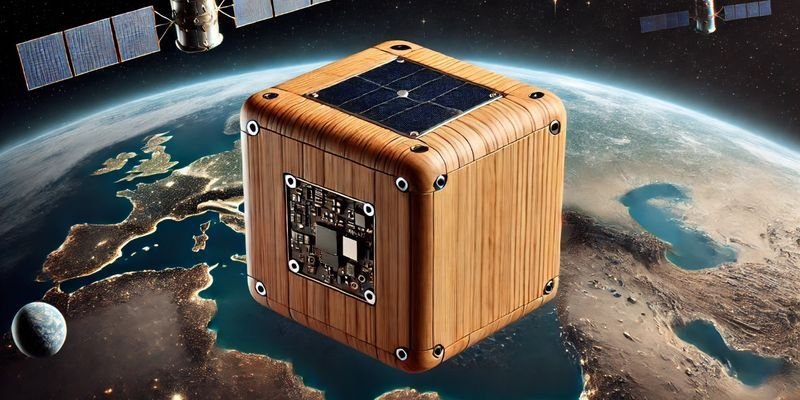Startup
Wooden Satellite – World’s first Satelite made of wood launched by Japan but there’s a problem!

In a groundbreaking leap for sustainable space exploration, Japan has launched the world’s first wooden satellite, aptly named LignoSat. This innovative endeavor, a collaboration between Kyoto University and Sumitomo Forestry, aims to assess the viability of timber as a material for space applications, potentially revolutionizing satellite construction and addressing the growing concern of space debris.
The Genesis of LignoSat

The concept of a wooden satellite emerged from the need to find eco-friendly alternatives to traditional satellite materials. Conventional satellites, primarily constructed from metals like aluminum, pose environmental challenges upon re-entry, releasing harmful particles that can affect the ozone layer and contribute to space debris. In contrast, wood offers a biodegradable solution, burning completely during re-entry without leaving harmful residues.
After extensive research, magnolia wood was selected for LignoSat due to its high workability, dimensional stability, and overall strength. This choice was reinforced by successful tests conducted aboard the International Space Station (ISS) in 2022, where magnolia wood samples demonstrated resilience against the harsh conditions of space, including extreme temperature fluctuations and exposure to cosmic rays.
Launch and Mission Objectives

On November 5, 2024, LignoSat was launched aboard a SpaceX Falcon 9 rocket, marking a historic moment in space technology. The satellite, measuring 10 centimeters on each side and weighing approximately 1 kilogram, was deployed into orbit from the Japanese experimental module Kibo on the ISS.
Over the next six months, LignoSat will orbit Earth, collecting data to evaluate the durability of wood in space. Instruments onboard will monitor the wood’s resistance to temperature variations, radiation, and other environmental factors. This data is crucial for determining the feasibility of using wood in future space structures, such as satellites and potentially even habitats on the Moon or Mars.
Environmental Implications
The use of wood in satellite construction presents significant environmental benefits. Traditional metal satellites, upon re-entry, can produce aluminum oxide particles, which are known to deplete the ozone layer and contribute to atmospheric pollution. In contrast, wooden satellites like LignoSat are expected to burn up entirely, leaving minimal environmental impact.
Moreover, wood’s natural properties allow for better permeability to radio waves, potentially enhancing communication capabilities. This characteristic could lead to more efficient designs for future satellites, reducing the need for external antennas and minimizing the risk of components detaching and becoming space debris.
While the wooden satellite presents a promising step towards sustainability in space, there’s an inherent paradox in the pursuit. On the one hand, wood offers clear environmental benefits—biodegradability, minimal impact upon re-entry, and the potential to reduce space debris. However, if this technology proves successful, it could inadvertently introduce the space industry to the complex issue of deforestation.
As demand for wooden satellites increases, so too might the need for specific types of wood that can endure the harsh conditions of space. If large-scale production follows, this could strain forestry resources, potentially encouraging deforestation to meet industry demand. This outcome would directly conflict with the goal of sustainability, raising questions about whether the net environmental impact would truly be positive. Magnolia trees, for instance, are already facing conservation concerns in some regions, and their use in space applications could accelerate depletion if not managed responsibly.
Moreover, the potential expansion of a “space forestry” industry—one that cultivates and harvests wood specifically for satellites and other space-related structures—poses ethical and environmental questions. Forestry management for such specific demands would need careful regulation to prevent unsustainable harvesting practices and ensure reforestation efforts match or exceed timber consumption rates. Without these controls, the environmental cost could overshadow the intended eco-friendly advantages of wooden satellites.
Future Prospects
The success of LignoSat could pave the way for broader applications of wood in space technology. Researchers envision the construction of wooden structures in space, leveraging wood’s sustainability and structural benefits. For instance, Sumitomo Forestry has plans to build the world’s tallest wooden skyscraper in Tokyo by 2041, demonstrating the versatility and potential of wood in modern construction.
In the context of space exploration, wooden habitats could offer sustainable living solutions on extraterrestrial bodies. Wood’s insulating properties and ease of assembly make it a promising candidate for building habitats on the Moon or Mars, providing protection against harsh environmental conditions while minimizing the ecological footprint.
While LignoSat represents a fascinating experiment in material innovation, it also reminds us of the delicate balance between technological progress and environmental stewardship. As we look toward the future of space tech, responsible resource management must remain a central priority to ensure that sustainability efforts here on Earth aren’t undermined by our ambitions beyond it.
Startup
Startup news and updates: Daily roundup (November 7, 2024)

Funding news:
Enlog secures Rs 1.75 Cr in equity funding
Enlog, a Delhi-based startup specialising in AI-powered energy management and IoT solutions, has secured Rs 1.75 crore in equity funding from Vinners.
The fresh funds will be used to boost its operations and accelerate its growth in India’s energy management sector.
Enlog, a Delhi-based energy management startup, was founded in 2019 by Bharath Rnkawat and Jharna Saha, focuses on IoT and AI-powered energy solutions to optimise electricity consumption and reduce carbon footprints. So far, it has managed 11,300 MWh of electricity and reduced over 2,000 tons of carbon emissions.
With over 15,000 users, Enlog aims to reduce carbon emissions by one million tons by 2027. It plans to triple its revenue from Rs 12 crore in 2024 to Rs 40-45 crore by 2025, focusing on expanding into key Indian metro cities like Bangalore, Hyderabad, Pune, and Indore.
Pulse bags $1.4M in a seed funding round led by Endiya Partners
, an advanced Agentic AI platform, has secured $1.4 million in seed funding from Endiya Partners, with participation from angel investors, including founders of Zluri and Yellow.ai, and other entrepreneurs and product leaders.
The funding will primarily focus on building a robust core team, enhancing the platform’s development, purpose-built LLMs, and Agentic AI capabilities.
It is launching its MVP in November 2024, following pilots with multiple design partners. The company plans to allocate resources for early go-to-market initiatives to establish a foothold in India and the US, paving the way for long-term growth and leadership in the AI-first product management space.
Hyderabad-based Pulse, founded in 2024, uses Agentic AI to collect customer feedback, analyse structured and unstructured data, and automate key processes like feature extraction, prioritisation, and product hierarchy creation.

Pulse Founders
Other News
DaveAI secures patent for real-time adaptive digital aisle, transforming customer engagement
, an interactive digital solutions, has been granted a patent by the Government of India for its “System and Method for Real-Time Adaptive Interactive Digital Aisle of Products.”
The patented system leverages DaveAI’s proprietary Affinity Engine, a multi-dimensional AI with an online learning genetic algorithm, powers real-time hyper-personalisation, allowing brands to craft adaptable and engaging digital customer experiences.
DaveAI combines machine learning with genetic algorithms to personalise customer interactions in real time. This allows brands to provide tailored recommendations, adapt to changing customer needs, and build lasting connections.
(The copy will be updated with the latest news throughout the day)
Startup
KL Rahul-backed Boldfit raises Rs 110 Cr from Bessemer Venture

Fitness brand Boldfit on Thursday said it raised Rs 110 crore in its series A round from Bessemer Venture Partners (BVP).
Boldfit, which sells everything from yoga mats and water bottles to protein powers and exercise apparel, plans to use the latest infusion for product innovation and brand expansion.
Boldfit, which was founded by Pallav Bihani in 2019, had earlier announced a strategic investment from cricketer KL Rahul in July. Rahul also joined the company as a brand ambassador.
“We believe sports and fitness is a rapidly growing market in India and Boldfit has emerged as an early leader in the space with its strong focus on product quality, holistic distribution, and strong brand partnerships. We’re excited to partner with Pallav and the team in their next stage of growth,” noted Anant Vidur Puri, Partner at Bessemer Venture Partners.
Boldfit had earlier outlined its plans to use the funds for the development of new product lines and enhance customer engagement through targeted campaigns and community development initiatives. Additionally, the company is also looking to optimise its supply chain and improve logistics to reduce delivery times.
Boldfit said it clocked revenue of Rs 73 crore in FY24 and expects to cross the Rs 500 crore threshold by FY26, which it had shared with Yourstory earlier.
The company currently claims to serve over one crore customers annually.
Startup
Simplilearn aims to reach EBITDA profitability in FY25

Blackstone-backed Simplilearn says it is well positioned to reach EBITDA profitability within the current financial year.
EBITDA or earnings before interest, taxes, depreciation, and amortisation reflects the operational profitability of the company. It focuses on the earnings generated from core operations before accounting for costs.
The company said, in a statement, that it has managed to cut down its losses by 75%, from FY23, as it focuses on achieving sustainable growth and operational efficiency. Additionally, it reported year-on-year revenue growth, with FY24 revenue touching Rs 773 crore, fuelled by pivotal initiatives taken to increase customer retention and higher referral rates.
“As we work toward profitability, we’re focused on strengthening our products to meet industry
needs, driving growth in the US and worldwide, and, above all, delivering an outstanding customer
experience. Our mission to transform lives through world-class education is always at the heart of
what we do,” said Krishna Kumar, Founder and CEO of Simplilearn.
The company has intensified its efforts in its commercial segment, particularly in the United States, through strategic partnerships with platforms, and collaborations with government bodies in Europe, Middle East, and Africa.
Simplilearn said it has significantly increased its course enrollment by doubling down on university partnerships, bootcamps, and certification training programmes.
Founded in 2010, the company last raised $45 million in a Series E round in 2022 from a consortium led by GSV Ventures.
Private equity firm Blackstone picked up a controlling stake in the company in July 2021 through a fund infusion of $250 million.
In pic: Krishna Kumar, Founder and CEO of Simplilearn
-

 Startup Stories1 year ago
Startup Stories1 year agoWhy Millennials, GenZs Are Riding The Investment Tech Wave In India
-

 Startup Stories1 year ago
Startup Stories1 year agoStartups That Caught Our Eyes In September 2023
-

 Startup Stories1 year ago
Startup Stories1 year agoHow Raaho Is Using Tech To Transform India’s Fragmented Commercial Trucking
-

 Startup Stories12 months ago
Startup Stories12 months agoMeet The 10 Indian Startup Gems In The Indian Jewellery Industry’s Crown
-

 Crptocurrency8 months ago
Crptocurrency8 months agoLither is Making Crypto Safe, Fun, and Profitable for Everyone!
-

 Startup Stories1 year ago
Startup Stories1 year agoHow Volt Money Is Unlocking The Value Of Mutual Funds With Secured Lending
-

 Startup Stories1 year ago
Startup Stories1 year agoWhy Moscow-Based Kladana Considers Indian SME Sector As The Next Big Market For Cloud Computing
-

 E-commerce1 year ago
E-commerce1 year agoTop Online Couponing Trends To Watch Out For In 2016




